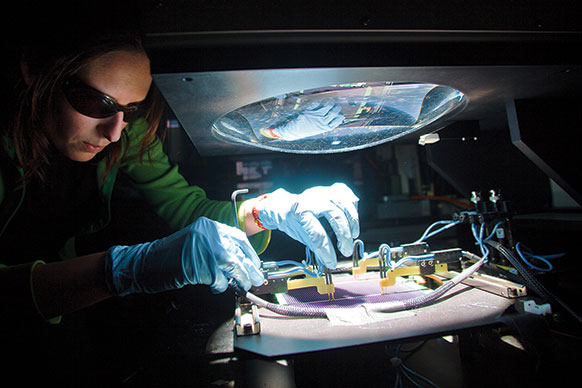Redesigning Solar Power
Many companies and researchers are trying to increase the power output of solar cells, the parts of a solar panel that absorb light and generate electricity. A lab at the Fraunhofer Center for Sustainable Energy Systems in Cambridge, Massachusetts, exists to improve everything else—the packaging that protects the cells, the junction boxes and other electronics, and the way panels are installed. Together, these factors account for about 60 percent of the cost of solar power today.

Utility-scale solar systems cost about $3.40 per watt of power they can generate (systems on the roofs of houses can cost twice that). About 26 cents goes for materials such as glass and protective coatings; that cost can be trimmed by using injection-molded frames and different materials for encapsulating the cells. Other advances could cut the cost of inverters, which now amount to 22 cents per watt, and the mounting hardware (about 25 cents). Then there’s wiring, labor, and design costs. The list goes on.
“They may seem like incremental improvements, but all of them together have an enormous potential to reduce costs,” says Christian Hoepfner, director of technical operations at the center, which will work with the solar industry to commercialize these improvements. One main task is to make sure that the changes don’t reduce the panels’ durability. Neither increasing power output nor decreasing installation costs would do any good “if the panels don’t last for 25 years,” he says.
Keep Reading
Most Popular
Large language models can do jaw-dropping things. But nobody knows exactly why.
And that's a problem. Figuring it out is one of the biggest scientific puzzles of our time and a crucial step towards controlling more powerful future models.
How scientists traced a mysterious covid case back to six toilets
When wastewater surveillance turns into a hunt for a single infected individual, the ethics get tricky.
The problem with plug-in hybrids? Their drivers.
Plug-in hybrids are often sold as a transition to EVs, but new data from Europe shows we’re still underestimating the emissions they produce.
Stay connected
Get the latest updates from
MIT Technology Review
Discover special offers, top stories, upcoming events, and more.